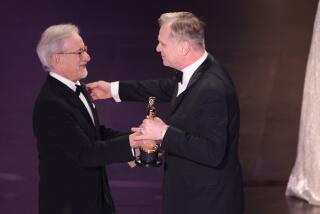‘Slumdog’ strikes it rich with 8 Oscar wins

“Slumdog Millionaire” -- a love story that combines artistic ambition with broad commercial appeal -- won a leading eight Oscars on Sunday night, including the best picture trophy.
While the film’s triumphs at the 81st annual Academy Awards marked an amazing outcome for a movie filled with subtitles, scenes of torture and a Bollywood dance sequence, the wins also cemented the reputation of distributor Fox Searchlight, which has become Hollywood’s top advocate of the kind of daring works that movie studios have all but abandoned.
Director Danny Boyle’s fictional account of a Mumbai orphan’s surprising winning streak on India’s version of “Who Wants to be a Millionaire” also won Oscars for direction, adapted screenplay, cinematography, editing, original score, original song and sound mixing.
The wins for the film -- produced by a British company, co-financed by a French distributor and made by a largely Indian cast and crew -- dramatized the global compass reading of contemporary movie production, as other top Oscar winners showed.
The best supporting actress winner was Spain’s Penelope Cruz for “Vicky Cristina Barcelona”; Australian actor Heath Ledger was posthumously named best supporting actor for “The Dark Knight”; and British star Kate Winslet won best actress for “The Reader.” The only acting winner with a U.S. birth certificate: Sean Penn, who played the title character in “Milk.”
Host Hugh Jackman opened the broadcast with a song and dance routine about the economic recession, and though he didn’t reference Hollywood cost-cutting specifically, belt-tightening was very much a part of the Oscar ceremony backdrop.
In a show business shakeup that has cost scores of film executives their jobs and left numerous movies in limbo, studios are scaling back not only on provocative dramas but also on the companies they established to produce and distribute them.
In the last year, Warner Bros. closed its two specialty film divisions, Warner Independent Pictures (the original distributor of “Slumdog Millionaire”) and Picturehouse, while Paramount closed the doors of its Paramount Vantage unit. ThinkFilm, a leading distributor of nonfiction films, has vanished, and the Weinstein Co. has scaled way back.
At the same time, the big movie studios are steering clear of highbrow literary dramas, aiming their resources at mass-appeal works including family-friendly animation, superhero stories and established franchises such as James Bond and Harry Potter.
As others have ditched movies that require patient marketing to build grass-roots audience interest -- “Slumdog Millionaire” debuted in just 10 theaters last November and didn’t reach its widest national release until last weekend -- Fox Searchlight has become Hollywood’s unequaled home for films made outside the normal studio channels.
A tiny cog in Rupert Murdoch’s global News Corp. media conglomerate, Fox Searchlight not only was able to steer “Slumdog Millionaire” to its multiple Oscar wins, but also turned it into a solid box-office hit, with domestic gross set to pass $100 million.
“It’s a triumph for this kind of film,” Boyle said backstage, minutes after he thanked Fox Searchlight from the lectern of the Kodak Theatre.
By far the most successful of the studio-owned specialty film divisions, Fox Searchlight had never before won the top Oscar, although it had best picture finalists three of the last four years with a varied slate of original, audience-pleasing works: 2007’s “Juno,” 2006’s “Little Miss Sunshine” and 2004’s “Sideways.”
While the best picture prize will make a nice ornament for Fox Searchlight’s lobby, the trophy also serves as a validation of the company’s patient, disciplined approach to making and distributing movies from outside the studio system -- even as the company’s peers are folding their tents.
Some of these companies were done in by profligate spending and steep overhead, which Fox Searchlight has consistently avoided. The company refuses to pay its actors more than $500,000 -- often a tiny fraction of their standard, multimillion-dollar salaries -- and carries a staff of about 75.
“I believe that size, in some ways, is the enemy of creativity,” said Peter Chernin, News Corp.’s president and chief operating officer, who launched the Fox Searchlight division more than 15 years ago. “The less money you risk, the more risks you can take. It gives you a chance to take more shots.”
Fox Searchlight was formed in 1994, and its early returns were unremarkable. But in the company’s third year, the division released the hit British comedy “The Full Monty” (written by “Slumdog Millionaire’s” Oscar-winning screenwriter Simon Beaufoy). Peter Rice, a Fox production executive, took over Fox Searchlight in early 2000, and the company and its core team -- marketing head Nancy Utley and distribution chief Steve Gilula -- flourished.
“They were there when I needed them, and they left me alone when I was doing fine,” said Alexander Payne, director and co-writer of the wine-tasting comedy “Sideways.”
Unlike bigger movie studios, which produce almost all of their movies, Fox Searchlight and other so-called independent distributors often buy completed movies at film festivals. Fox Searchlight has enjoyed an incredible run with its festival acquisitions, buying the teen comedy “Napoleon Dynamite” for $3 million (it grossed $44.5 million) and the beauty pageant comedy “Little Miss Sunshine” for $10.5 million (it grossed nearly $60 million).
When the British producers of “Slumdog Millionaire” first shopped the movie to American distributors nearly two years ago, Fox Searchlight refused to pay the $5 million asking price.
When the film came Fox Searchlight’s way once again, Rice bought distribution rights from Warner Bros. for $2.5 million.
Filmmakers (and the company’s competitors) say Fox Searchlight’s real gift is marketing and publicity, creating a system where the movie -- rather than flashy, pricey advertisements -- is allowed to sell itself. One common tactic: dozens of free screenings around the country, weeks before a film hits theaters.
“We were in a different city every night,” said Valerie Faris, who co-directed “Little Miss Sunshine” with husband Jonathan Dayton. “It was all about building up anticipation.”
Fox Searchlight’s handling of “Slumdog Millionaire” has been especially skillful. Though the film features scenes of a brutal police interrogation, abject poverty and child abuse, Fox Searchlight has positioned it as a feel-good romance.
“At first, you hear that it’s in Hindi and that it’s violent,” said Bob Berney, the former head of Picturehouse. “And then you start hearing from moviegoers, ‘It’s changed my life.’ That’s better than any advertisement.”
At a time when a lot of dramas -- not to mention movies with subtitles -- have struggled at the box office, “Slumdog Millionaire” has grossed $98 million in domestic theaters, and with the Oscar wins could soon pass “Juno” (total gross: $143.5 million) as Fox Searchlight’s highest-grossing film.
“Fox Searchlight has established its supremacy by identifying the soul of their films,” said Jason Reitman, the director of “Juno” and “Thank You for Smoking,” another Fox Searchlight hit. “No other studio has been able to match their ability to find the accessibility point of such tricky subjects as middle-aged wine tasters, beauty pageants, teenage pregnancy and now the slums of India.”
Times staff writer Chris Lee contributed to this article.
More to Read
Sign up for Essential California
The most important California stories and recommendations in your inbox every morning.
You may occasionally receive promotional content from the Los Angeles Times.











